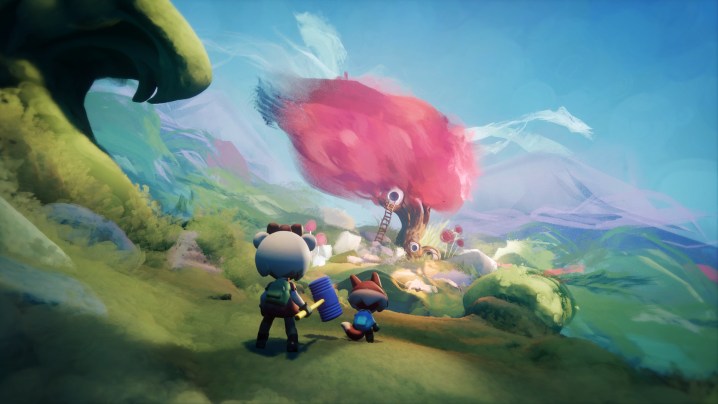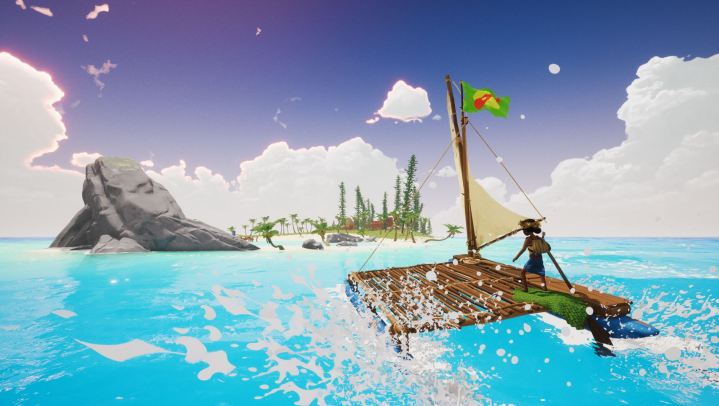While PlayStation continues to thrive thanks to big-budget games like God of War Ragnarok, two recent events show how much Sony’s video game brand is changing. The first came when the Sony-owned studio Media Molecule would end support for Dreams, a PS4-exclusive experience creation tool allowing players to build and share games with one another, later this year.
Shortly after that news, PixelOpus — another Sony-owned studio — announced it would be shutting down on June 2 after publishing just two titles: Entrwined in 2014 and Concrete Genie in 2019. In its tweet, PixelOpus stated “Dear friends, our PixelOpus adventure has come to an end. As we look to new futures, we wanted to say a heartfelt thank you to the millions of passionate players who have supported us, and our mission to make beautiful, imaginative games with heart. We are so grateful!”
Between these recent moves, as well as its doubling down on its blockbuster franchises and live-service titles, PlayStation is moving further away from the charming, varied games that helped it stand out in the past. Though there may still be some ways for the company to keep that spirit alive through some of its new initiatives.
Imagination nation
The PlayStation brand didn’t always use to be synonymous with big-budget, third-person, single-player narrative adventure games. That change would only come during the PS3 generation with the success of series like Uncharted. Prior to that, first-party Sony exclusives tended to be more varied or experimental. Ratchet and Clank, Sly Cooper, and Jak and Daxter are cited as some of the best games of the PS2 generation, and one-off games like Fantavision helped keep the console’s library eclectic.
Moving into the PS4 generation, we were still getting these heartfelt and charming games in the form of Gravity Rush and its sequel, Tearaway, and Concrete Genie. Somewhere around the halfway point of the PS4 generation, though, titles like that started to become more scarce.

There isn’t a firm moment at which PlayStation shifted its focus primarily on its cinematic blockbusters; it was a slow transition. Moves like closing down Japan Studio, Insomniac committing to more Marvel games, and hiring Sumo Digital to make Sackboy: A Big Adventure rather than developing it in-house were all signs of the change, alongside doubling down on larger budgets and multi-media expansions for their more “prestige” franchises like God of War. Those series aren’t new, but they used to stand alongside the off-beat and charming characters instead of alone.
Looking forward, PlayStation has shown no indication of serving up these weirder titles in a major way. Astro’s Playroom being packed in with the PS5 gave some hope, but we’ve seen little in that same vein over the past few years. The fact that Fantavision 202X, the sequel to a first-party PS2 launch title, was released for PSVR2 without PlayStation publishing it (or advertising it much at all alongside Horizon: Call of the Mountain) shows its lack of commitment to the kind of diverse games that made its previous consoles unique.
Smaller games, bigger heart
It seems clear why PlayStation is moving in that direction: money. God of War Ragnarok, The Last of Us: Part 1 and Part 2, and Marvel’s Spider-Man all sell in the millions, while Dreams wasn’t even able to break into the top 25 best-selling games the month it launched. From a business perspective, investing more in these big franchises, as well as looking to break into the live service space with one of their more than 10 games in development utilizing Bungie’s expertise, makes sense.
Accepting the fiscal realities of game development in 2023, it’s true that something would have to shift in how smaller, niche titles were made or monetized. That said, PlayStation already has the answer in the form of its new tiered subscription service, PS Plus. Sony could take a page out of Xbox’s book and invest in passion projects that could launch in the Essential or Premium tiers to entice players to subscribe.
That’s a tactic it’s already employing using other studios’ games, beginning with the indie hit Stray, and the recent example of Tchia, both launching as day-one additions to the service. There’s an opportunity here for Sony to fill its service with its own smaller, first-party games that wouldn’t need to be sales behemoths to provide value to the brand.

The reality is that the best we can realistically hope for in terms of seeing any more of these eccentric games likely comes down to PlayStation’s new mobile division. When the division was announced (alongside the acquisition of Savage Game Studios), the Head of PlayStation Studios Hermen Hulst made it clear that they would be taking advantage of both new and existing PlayStation IP. Perhaps we’ll see some long-forgotten PlayStation franchises pop up on our phones instead of our PS5.
As much as I look forward to the next Horizon or Ghost of Tsushima games, there’s no doubt a sense of familiarity in PlayStation’s current first-party output. While a colorful and charming game like Tearaway, or an imaginative and creative experience like Dreams can never hope to be as popular as the likes of those blockbusters, that shouldn’t be the only metric of success. Those massive titles can bring people in, but variety can help keep players in an ecosystem.
Being weird, taking risks, and offering new and unique experiences used to be core to PlayStation’s DNA. With that gone, the platform has lost a bit of what made the PlayStation brand so special when it began.
Editors’ Recommendations
Services Marketplace – Listings, Bookings & Reviews